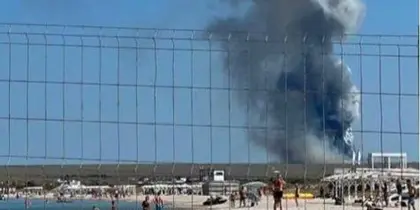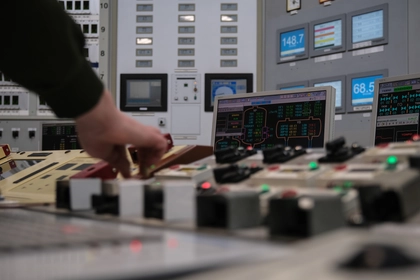In a daring dawn raid with small boats, Ukrainian commandos damaged a critical Russian air force radar base operating on the Crimea coast, as Kyiv widened a campaign of long-range attacks against the Russian-occupied peninsula.
Ukrainian special operators landing near the Crimean resort village Mayak hit an air space monitoring installation manned by the Russian Aerospace Forces’ 3rd Radio Engineering Regiment, knocking out a Nebo-M radar and Kasta-2E2 radar, effectively shutting down the site for months, Andriy Yusov, the spokesman for the Main Intelligence Directorate of the Ministry of Defense (HUR), said in Thursday evening television comments.
- Check out the freshest Ukraine news items as of today.
JOIN US ON TELEGRAM
Follow our coverage of the war on the @Kyivpost_official.
The Armed Forces of Ukraine’s (AFU) early Thursday morning attack against the sensitive military installation in Crimea, a Ukrainian territory annexed illegally by Russia in 2014, reportedly met no resistance.
Social media images recorded by beachgoers at the adjacent village of Olenivka showed smoke rising from the base. Tourist comment on audio reported gunfire and explosions at the military site.
The Russian coastal missile complex "Bastion" was destroyed as a result of an explosion in occupied Crimea, - Petro Andriushchenko, adviser to the mayor of Mariupol.
— UkraineWorld (@ukraine_world) August 23, 2023
It has also been reported that the Russian air defense system on the Tarkhankut peninsula near Olenivka village. pic.twitter.com/MVsezSaFZj
The Ukrainian media platform Krym.Realii reported the first explosions took place “around 5 a.m.” A statement from the Moscow-controlled Crimea regional government confirmed that armed Ukrainians had landed near Cape Tarkhankut and the village of Olenivka, and that local security forces were responding to the raid.

Drones Strike High-Rise Buildings in Russia’s Kazan
Yusov said the HUR commandos killed or severely wounded as many as 30 Russian military personnel and destroyed four Russian navy motorboats before escaping without casualties. HUR later released video showing Ukrainian commandos aboard Zodiac-style amphibious boats and firing crew-served weapons.
Special operations forces of Ukrainian military intelligence with the Ukrainian Navy landed on the shores of Crimea in small boats. They engaged in combat with Russian occupiers in the area of Olenivka and Mayak, inflicting losses.#CrimeaIsUkraine https://t.co/sDGlZw5v3n pic.twitter.com/0JccRnqSYj
— Michael MacKay (@mhmck) August 24, 2023
Other images showed masked operators standing on a beach purportedly near Mayak base and displaying a Ukrainian flag.
There were no images supporting Russian personnel losses or damage to Russian military equipment.
The Nebo-M is a high-end multi-functional military radar system mounted on a heavy truck. It is advertised by the Kremlin to be capable of monitoring air space to a range of 1,200 kilometers and handing over the location of detected aircraft to anti-aircraft missile launchers. The Kasta-2 radar has a range of 40 kilometers and is designed to detect aircraft flying even only a few meters above the ground. According to Ukrainian military intelligence, the Mayak base is a critical piece of the Kremlin air surveillance network over the central Black Sea.
There was no early official Kremlin comment on the attack. Boris Rozhin, a Moscow-based blogger and “military correspondent” strongly supporting Russia’s invasion of Ukraine, in Friday morning comments said the Ukrainian raid was “chased away by a single security guard with a carbine,” that no Russian facility had suffered any damage and that the whole operation was little more than a Kyiv plan to create images for TikTok.
By contrast, the equally pro-Kremlin blogger Vladimir Rogov, in a Thursday comment on his Telegram channel RybarZ, accused Crimean authorities of lying about damage caused by the Ukrainian raiders and claiming no Russian losses were suffered, when in fact surveillance equipment was damaged and service personnel were killed.
More to come
The Thursday commando attack was part of an increasingly intense Ukrainian campaign to damage Russian military infrastructure in the peninsula, Rogov said.
“This is already the second incident in the vicinity of the Cape (Tarkhankut) in the last few days. Very recently the AFU ran a complex attack at this location that destroyed an S-400 anti-aircraft system, and now they (AFU commandos) are making amphibious landings,” Rogov said.
On August 23, according to official Kyiv reports, Ukrainian naval units fired a Neptune cruise missile from an undisclosed location to strike and destroy a Russian 48Y6-K1 Podlet air reconnaissance radar, the main air surveillance system for Russia’s top-of-the-line S-400 Triumph anti-aircraft missile.
The attack – at a range of at least 110 kilometers, and hitting an S-400 battery in Olenivka, adjacent to the village of Mayak – also destroyed an S-400 missile launcher, Ukrainian military journalist Yuriy Butusov wrote in a Thursday report.
⚡️Russian #S400 system destroyed in temporarily occupied #Crimea, Ukraine’s Intelligence reported.
— KyivPost (@KyivPost) August 23, 2023
An explosion occurred near the village of Olenivka on Cape Tarkhankut, destroying a Russian long- and medium-range S-400 Triumph air defense system. The system itself, its missiles… pic.twitter.com/jBx9VTbl64
HUR spokesmen confirmed the strike and use of a Neptune missile. According to Butusov, Ukrainian engineers at the Kyiv-headquartered Luch design bureau reconfigured the domestically developed anti-ship missile to a ground-targeting role, following Russia’s invasion of Ukraine in February 2023.
The complex revamping of an anti-ship into an anti-radar missile was a military technology first for Ukraine, he said.
The Russian air force’s ability to track and intercept NATO surveillance aircraft operating in international air space over the Black Sea was likely severely degraded by the Neptune missile strike, followed up the next day by a punishing commando raid, military analysts said.
Russian sources reported a near-swarm of Ukrainian drones launched towards Crimea overnight Aug 24-25. Kremlin information platforms on Friday claimed 42 aircraft were shot down and Russian facilities and personnel were not hurt.
Why Crimea?
Mick Ryan, a retired Australian major general and veteran Ukraine watcher, in comment to Kyiv Post said that Kyiv has likely embarked on a systematic campaign to degrade Russian air defenses in Crimea, with the additional political goal of maintaining pressure on Kremlin leadership, and forcing Moscow to choose between reinforcing the peninsula or the front lines, where Russian soldier morale is falling and the AFU is attacking.
“I think there are multiple reasons why we are seeing this now. First, there is a political imperative for the Ukrainian government to ensure Crimea remains part of their unified ‘liberate Ukraine’ plan and isn’t separated out by foreign politicians.
"The other political imperative is to communicate to Ukraine’s supporters that there is more to their 2023 campaigns than just the southern front. Militarily, the Ukrainians have been isolating Crimea with multiple bridge strikes. But more importantly, they are putting the Russians in a dilemma and forcing the Russians to make tough choices about deployment of forces in Crimea and other places.
"There is a psychological aspect – Ukraine wants the Russians to be looking to their front but also looking over their shoulders to the south, while thinking ‘how much longer can we sustain this?’” Ryan said.
Ben Hodges, a retired US Army lieutenant general and former commander of NATO forces Europe, in comment to Kyiv Post praised the Ukrainian military leadership for conducting an intelligent, complex and multi-dimensional strike campaign against Russian forces. The recent round of Ukrainian attacks was calculated, effective, and far from the last, he said.
“The attacks definitely were not random or pin pricks. These are very sophisticated, part of a larger effort to retain the initiative, to keep Russian commanders on the backfoot, and gradually make Crimea untenable for Russian navy and air force and air defense. It is part of the larger counteroffensive effort… multi-domain (MDO) and multi-dimensional. The Pentagon talks a lot about MDO… Ukraine is actually doing it,” Hodges said.
Luke Coffey, a senior security researcher at the Washington DC-headquartered Hudson Institute, said the attacks against Crimea are part of a campaign that will run some time and that are a tailored part of Kyiv’s overall strategy to defeat Russia.
“I think Ukraine’s activities in Crimea are one part of its larger counteroffensive. The same can be said for the drone strikes inside the Russian Federation. Of course, there is a certain symbolism associated with a (command) raid on occupied Crimea on Independence Day, but I wouldn’t see this as an isolated event, Coffey said.
“Everyone needs to be patient and calm when it comes to the counteroffensive. It’s impossible to declare it a success or failure until it’s over, and there could still be months left before it finishes.”
HUR spokesperson Andriy Chernyak in a Friday comment to Kyiv Post said the Ukrainian campaign to hit targets in Crimea will continue.
“These are planned acts for the liberation of the temporarily occupied territories of Ukraine. We will continue to destroy Russian forces in the occupied territories,” Chernyak said.
You can also highlight the text and press Ctrl + Enter









